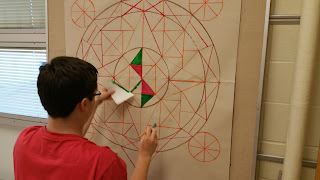"... information severed from thoughtful action is dead, a mind-crushing load." John Dewey, Democracy in Education
"How much of our education is real doing, real self expression? Handwork is too often the making of a pin tray under the eye of an expert." A. S. Neill, Summerhill
Thinking about the four practices of Teaching for Artistic Behavior, "students as artists," "pedagogy," "classroom context" and "assessment," the integral role of democracy as a necessary element in the transaction of these practices cannot be overlooked. When Kathy Douglas and Diane Jaquith formulated Teaching for Artistic Behavior, a flexible blue print for democratic education within test-centric learning environs was created.
TAB learning experience is an opportunity for children to practice self-expression and adaptation on a regular basis within a dynamic environment where development of voice and self-sufficiency are critical learning components.
Intellectual identities are established in the formative years of K-12 schooling.
If I learn early on in my developmental years, my voice does not matter, why would I want to participate in a larger system that views my existence as marginal?
When test scores and test-prep-like-activities take precedence over student voice, there is a price to pay.
That price is civic engagement.







No comments:
Post a Comment